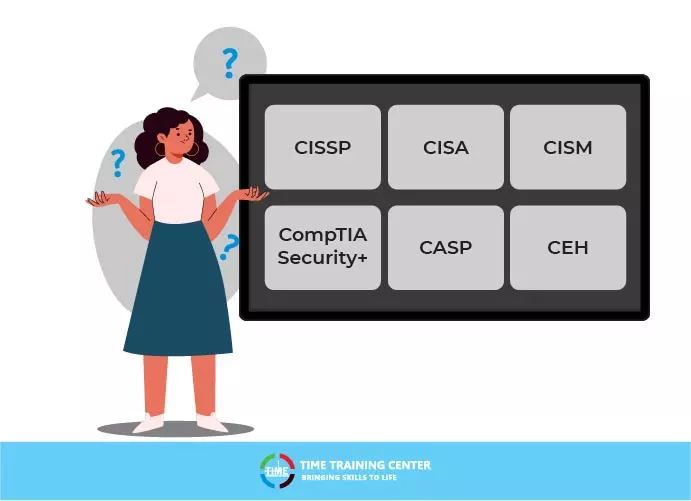Hacking has become a significant threat to organisations all around the world. Cybercrime is on the rise, and people are becoming more concerned with their security online, so they want to do everything in their power to protect themselves. However, the best way to defend against cyber attacks is to invest in cybersecurity certifications.
Cybersecurity is the process of preventing computers, networks, and data from being stolen, damaged, lost, or accessed without permission. Cybersecurity professionals must be certified by the best certifications to carry out these vast responsibilities; only then can they provide the best service.
In this blog, we will guide you on the top cybersecurity professionals to make an informed decision when choosing the certification that best suits your job role.
Why Get Cyber Security Certifications?
Cybersecurity is a fast-paced and evolving field. To keep up with the latest developments, you need theoretical knowledge of computer science and certifications that confirm your ability to perform information security.
The reason to get cyber security certifications may vary from one person to another. It may include:
-
The constant change in the business environment creates a high demand for cyber security professionals
-
A new pathway for better job opportunities
-
Hike in remuneration
-
Excellent addition to your resume
-
To stay up-to-date on the current trends of information security
There are so many different types of cyber security certifications available that suits your needs, made by organisations such as:
Cyber Security Job Roles
You may wonder what job roles you can go for once you achieve a top cyber security certification. There is a pool of options to choose from, depending on your needs and requirements. The cyber security job roles and salaries can also vary from what kind of certification you have acquired with thorough training from cyber security courses and experience. Some of the job roles are:
With the proper guidance and rigorous training, you can pursue any of the above and more job roles related to information security.
Best Cyber Security Certifications
The following are the top cyber security certification that you can avail to achieve your goals:
-
CISSP (Certified Information Systems Security Professional)
-
CISA (Certified Information Systems Auditor)
-
CISM (Certified Information Security Manager)
-
CompTIA Security+
-
CASP (CompTIA Advanced Security Practitioner)
-
CEH (Certified Ethical Hacker)
1. CISSP (Certified Information Systems Security Professional)
The Certified Information Systems Security Professional (CISSP) certification is designed for experienced security professionals who want to take their careers to new heights. Issued by (ICS)2 will validate your knowledge in designing, implementing, and monitoring network programs.
You must have 3-5 years of work experience in any two CISSP domains to avail this certification. The eight domains of CISSP Common Body of Knowledge (CBK) are:
-
Security and Risk Management
-
Asset Security
-
Security Architecture and Engineering
-
Communications and Network Security
-
Identity and Access Management
-
Security Assessment and Testing
-
Security Operations
-
Software Development Security
The well-known job roles that you can achieve with the CISSP certification include the following:
-
Chief Information Security Officer
-
Security Systems Administrator
-
IT Security Engineer
-
Information Assurance Analyst
-
Senior IT Security Consultant
-
Senior Information Security Assurance Consultant
2. CISA (Certified Information Systems Auditor)
CISA certification from ISACA is a widely recognised and essential security certification that covers information audit control, assurance and risk management. Being accredited with CISA proves that you are trained to assess vulnerabilities within an organisation while reporting compliance issues concerning data privacy legislation or internal policies for business practices.
It teaches you the importance of digital security, and it mainly focuses on information auditing. Hence, you must have at least five years of experience handling information system auditing, control assurance, or security. The domains of CISA as stated by ISACA are:
-
Information Systems Auditing
-
Governance and Management of IT
-
Information Systems Acquisition, Development and Implementation
-
Information Systems Operations and Business Resilience
-
Protection of Information Assets
The CISA certification is specifically designed for mid-level IT professionals who will later have access to job roles like:
3. CISM (Certified Information Security Manager)
CISM certification from ISACA is a great way to learn about the managerial side of cybersecurity, including topics like governance and program development. It is a must-have for IT workers working on large-scale business applications to establish the most acceptable security procedures.
It is set for IT professionals enterprise-level security management responsibilities. It requires you to have at least five years of work experience in information security management. With CISM, you will gain advanced knowledge in:
-
Information Risk Management
-
Information Security Governance
-
Information Security Incident Management
-
Program Development and Management
Jobs that you can avail using CISM certification include:
4. CompTIA Security+
CompTIA Security+ is an entry-level security certification that validates the core skills needed in any cybersecurity role. This certification teaches you cryptography, threat management, identity management, network access control, security systems, risk identification and mitigation.
There is no better certification for an entry-level candidate with at least two years of work experience. Through Security+, you will be prepared to recognise potential threats and respond to each crisis. The topics that you will learn from Security+ are:
-
Attacks, Threats, and Vulnerabilities
-
Architecture and Design
-
Implementation of Effective Security Policies
-
Operations and Incident Response
-
Governance, Risk, and Compliance
Once you have completed rigours training and have achieved Security+ certification, you can go for the following job, but it is not limited to them:
-
Security Engineer
-
Security Administrator
-
Network Administrator
-
Cloud Engineer
-
Security Specialist
-
Software Developer
5. CASP (CompTIA Advanced Security Practitioner)
The CASP exam is designed for cybersecurity professionals that want to continue their careers in technology rather than management. The exam covers various topics, including enterprise security domain, risk analysis, and software vulnerability.
CASP is an advanced-level certification, where the candidate requires five years of hands-on experience with technical security and ten years of IT administration experience. The topics that are included within CASP include:
-
Risk Management
-
Enterprise Security Architecture
-
Enterprise Security Operations
-
Technical Integration of Enterprise Security
-
Research, Development, and Collaboration
The CASP certification can provide more complex architecture, risk management, and enterprise security integration jobs. Some of the job roles include:
6. CEH (Certified Ethical Hacker)
The Certified Ethical Hacker is a widely recognised certificate among security professionals. This highly sought after certification is beneficial for anyone who works within security, regardless of offensive or defensive.
Hacking for ethical purposes is known as white hat hacking. Penetration testing or red teaming is the process of lawfully hacking businesses in order to look for vulnerabilities before black hat hackers do so. To be eligible to take the CEH certification, you should complete an official training from EC-Council, or an EC-Council accredited training centre. Alternatively, you must have two years of work experience in information security.
With CEH certification, you can consider jobs like:
To Sum Up
There is a huge need for professionals skilled in the best cybersecurity certifications. The best cyber security certification would equip aspirants to take jobs like penetration tester, network security specialist and ethical hacker. Before pursuing a certified professional course, You must clearly understand the purpose of entering into the field of cyber security and what your responsibilities will be.
 +971 2 6713828
+971 2 6713828




